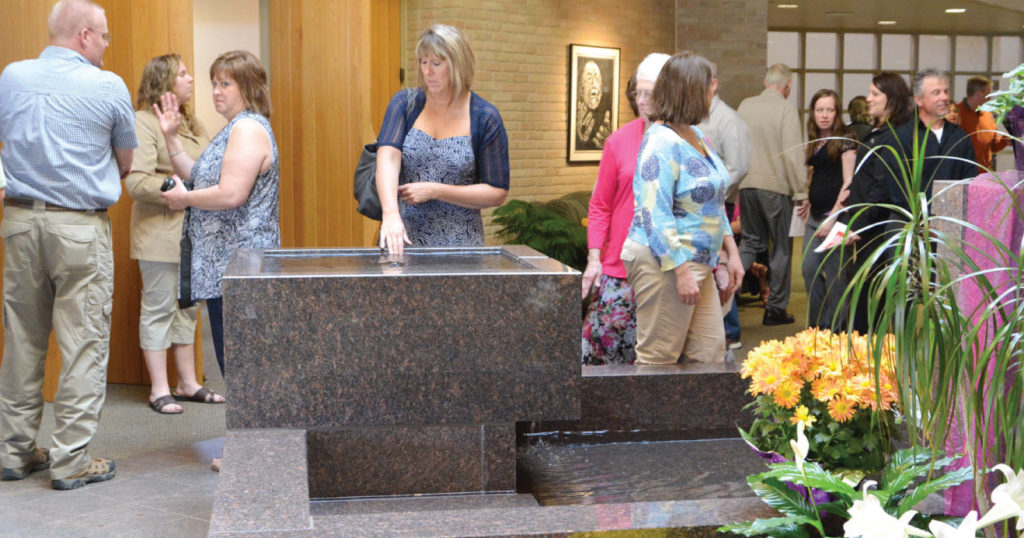
Amazingly, Sunday’s gospel tells us that even as the eleven disciples pay Jesus homage, some entertain doubts. Their faith and trust in him do not take their doubts away. But in this final, climactic scene of the gospel, Jesus charges both those who worship him and those who doubt: Go and make disciples of all nations, baptizing them in the threefold name of the God they have come to know in their time with Jesus — Father, Son, and Holy Spirit.
This baptismal formula, which we still use today, is very ancient, stretching back into the Church’s earliest tradition and finding a place in the great commissioning that ends Matthew’s gospel. The risen Jesus promises to be with the eleven in continuing his mission of baptizing and teaching his new law of love.
Christians follow Jesus’ example in naming God in intimate, relational terms. As baptized Christians we follow Jesus in calling God Father; we claim kinship with God, creator and source. We claim Jesus as one of us, God’s Son, redeemer and liberator. We live in the Spirit, the animating giver of life, the sustainer and sanctifier, who brings to fulfillment all that God has begun in creation and revealed in Jesus the Christ.
- What does baptism in the name of the Father, Son, and Holy Spirit mean to you?
Christian faith in God as Trinity grows out of scripture. The Old Testament describes God as Creator and also the great I Am who hears the cry of the Hebrew slaves in Egypt and sends Moses to set them free.
The Spirit of God stirs the waters (Genesis 1.2). The Spirit speaks in prophets and will anoint the messiah with familiar gifts — “The Spirit of the Lord shall rest upon him, the spirit of wisdom and understanding, counsel and strength, knowledge and awe” (Isaiah 11.2). The prophet Joel envisions God pouring out the Spirit on all flesh, sons and daughters, young and old (2.28). At Pentecost Christians experience Joel’s prophecy fulfilled.
Each of the four gospels tells us the Spirit comes upon Jesus at his baptism. A voice from heaven affirms, “You are my beloved Son.”
Jesus expresses his relationship with God as a father-son bond. He teaches us to pray, “Our Father.” Jesus is put to death for claiming to be the Son of the Blessed One, the messiah.
- What does creation reveal about God?
- What does the incarnation reveal about God?
- What does the activity of the Holy Spirit in our lives reveal about God?
How can Christians baptize in the name of the Father, Son, and Spirit, and yet believe in one God? For two millennia theologians have sought to find words for this revelation in our holy history.
The Greek Church fathers from Cappadocia, especially St. Basil of Caesarea, developed language for speaking about the Trinity that the Council of Nicaea affirmed in the Nicene Creed (AD 325).
John Zizioulas, an Orthodox theologian today, explores the roots of the word person, which we use to describe the Trinity as three persons in one God. To play their roles in Greek tragedies, actors wore masks called prosepon in Greek, persona in Latin.
Ancient Greeks believed fate rather than free will ruled their lives; their destinies were set. However, during a drama while the characters wore masks, the audience perceived them acting freely until ultimately fate caught up. Greek theologians used the word for mask, persona, to describe an individual acting freely.
As Christians, Greek theologians didn’t believe in fate but like Jews believed God created freely out of nothing and made humans free in God’s own image. Out of these roots grew the concept of person, one able to relate freely, able to love. God is a communion of persons, three in one love.
St. Thomas Aquinas in the AD 1200s understood God as Pure Act of Be-ing, in which to be, to know, and to love perfectly coincide. The Father generates the Son; in the generation of the Word, God knows Godself; in the procession of the Holy Spirit, God loves Godself.
Our heads start to hurt with these efforts to think about God, whom we experience as close as we are to ourselves but beyond the adequacy of our words. Importantly the Trinity is a communion of equals, not a monarchy, giving us community and mutual love as models of how to live on earth as in heaven.
- What is at stake in trying to understand God as a communion of equals?
Our God is no smug solitary being enclosed in egocentric self-regard but the living God, three persons in free communion, always going forth in love and receiving love. Our Judeo-Christian traditions testify that our God is irrepressibly friendly, steadfast, faithful, and compassionate toward us.
Three is one more than two, the starting point for social life, notes Brazilian theologian Ivone Gebara. A pregnancy calls married couples to make room in their relationship for another. Gebera grounds her reflection on the Trinity in our human experience of being diverse and multiple but one in origin and being.
As human persons we live in relationships that like molecules with a positive valence stay dynamically open to other bonds. In the social interaction at the heart of our thriving, we experience the dynamic at the irrepressibly generative, life-giving, love-outpouring heart of God.
“Being in communion constitutes God’s very essence — mutual love, love from love, unoriginate love,” writes contemporary theologian Elizabeth Johnson in her book She Who Is. The Spirit is mutual love, the Son is love from love, the Father is unoriginate love.
- How do you address God in prayer?
- How do you experience God — within yourself, in relationships with others, in creation, in scripture?
